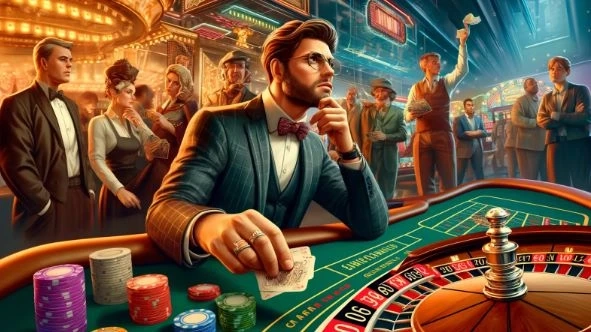From the roulette tables to the flicker of slot machine lights, the thrill of gambling often dances hand in hand with a myriad of psychological traps—one of which is prominently known as the Gambler’s Fallacy. As you wade through the sea of chance, and before you next visit https://houseof-pokies.bet/, let\'s unpack this deceptive thought pattern and share some tips on how to sidestep its sneaky clutches.
What Exactly is the Gambler’s Fallacy?
Imagine this: you\'re watching a coin flipped repeatedly, and it lands heads five times in a row. What are you betting on for the next toss? If you\'re leaning towards tails, because "it’s due," you\'ve just fallen prey to the Gambler’s Fallacy. This fallacy is the belief that past events can influence the likelihood of something happening in the future in a purely random scenario.
But why do we succumb to this flawed thinking? Blame it on our brains. Humans are pattern-recognition machines, wired to see order in chaos, to predict, and to expect balance.
Dissecting the Deception
Roulette wheels don’t have memories, nor do cards or dice. Each spin, draw, or roll is an independent event, but our mind often refuses to accept simplicity. Say a roulette wheel lands on black five times in a row; the gambler’s fallacy would have many bettors piling on red the next spin. This thought process seems logical – a balancing act of sorts – but, alas, it’s as fruitless as expecting the weather to change with a flip of a coin.
Stepping Beyond Misjudgment
- Knowledge is Power: Arm yourself with the understanding of randomness and independent events. Knowing that the outcome of one roll has zero bearing on the next might just be the armor you need.
- Statistical Literacy: Dabble in the basics of probability. Tools and simulations that demonstrate how outcomes unfold independently can demystify the process, grounding your decisions in reality, not superstition.
- Mind Over Matter: Practice makes almost perfect. Expose yourself to situations where you can observe randomness, without the risk—perhaps with simulations or friendly, non-monetary games.
- Set Limits: Decide beforehand how much you’re willing to wager, and stick to it. Setting firm boundaries helps keep your head clear and guards against the temptation to "chase losses."
- Mindfulness and Meditation: Cultivating awareness of your thoughts and emotions can provide the insight needed to catch yourself before falling into cognitive traps.
A Fresh Perspective on Old Games
Breaking free from the Gambler’s Fallacy isn\'t just about avoiding a trap; it’s about fostering a healthier relationship with gambling. It’s the difference between a knight charging into battle with armor and strategy, versus one charging in wearing only optimism for protection.
So, before your next venture to the virtual or physical gambling halls, remember: each play is a new scene, with no scripts and no guarantees. Whether you’re spinning the wheel at House of Pokies or rolling dice with friends, keep it light, keep it sensible, and keep it fun.
Concluding Thoughts
In the world of gambling, armed with knowledge and a keen awareness of our cognitive biases, we can make smarter, more rational choices. Next time the dice are cast, remember – it\'s just the universe doing its thing, and you, playing your part without falling for the psychological sleights of hand that lead so many astray. Embrace the randomness, enjoy the ride, and gamble responsibly. After all, the house doesn’t beat the player because it cheats; it wins because the rules of probability are on its side.


